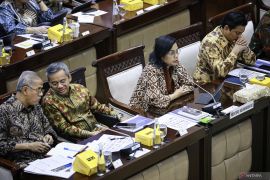Monthly inflation rate hit a four-year high of 1.03 percent in January as massive floods disrupted the distribution of food commodities in many parts of the country, leading to a sharp rise in their prices.
On-month inflation rate moved up again to the tune of 0.75 percent in February.
To the surprise of many people, monthly inflation rose for a third straight month in March to 0.63 percent, the highest in the same month over the past five years, fueled by surging prices of horticultural commodities, such as onion and garlic due to scarcity in their supplies.
That compared with 0.07 percent in March 2012. Even between 2009-2011 Indonesia recorded deflation in March, along with the arrival of rice harvest.
Head of the Central Statistics Agency (BPS) Suryamin said early April the high inflation rate in March was mostly contributed by volatile food prices.
According to the BPS, a fluctuation in commodities prices contributed 0.52 percent to March`s inflation rate.
"The cause of inflation from fluctuating prices we have detected since February is an increase in the prices of several commodities," he said.
He said general inflation components contributed 0.63 percent, core inflation 0.06 percent and administered-prices 0.05 percent to March`s inflation rate.
"The core inflation and administered prices are relatively manageable," he said.
On expenditure side, food stuffs contributed 2.04 percent, processed foods, beverages, cigarettes and tobacco 0.4 percent, health care 0.24 percent, and recreation and sport 0.12 percent to March`s inflation rate.
The monthly inflation rate in March brought calendar year inflation for January-March 2013 to 2.43 percent and year-on-year inflation to 5.9 percent.
Economist Ninasapti Triaswati has predicted that the year-end inflation rate may shoot up to 7 percent this year if the government mismanages food supplies and fuel subsidy policies.
"The year-on-year inflation may exceed the government`s and Bank Indonesia`s targets as the inflation rates in the first three months of this year are already quite high," she said on Thursday (April 4).
Throughout this year the country will still face a lot of important moments, such as the Islamic fasting month of Ramadan and the subsequent festivities of Eid-al-Fitr that may have an impact on the inflation, she said.
"If the government takes wrong policies in managing food supplies during the Eid-al-Fitr festivities the inflation rate target will be exceeded. The increase in food prices alone will push up the inflation to up to 7 percent," she said.
The other factor that may increase the inflation rate is expected inflation as a result of the government`s plan to scrap fuel subsidies, she said.
"If the fuel prices are raised the inflation rate will increase accordingly. Right now the government has not issued any decision with regard to fuel subsidies so the people still guess what the government will do," she said.
Economist Agustinus Prasetyantoko of Atma Jaya Catholic University said the higher inflation in March will make it impossible to keep the yearly inflation rate below the government-set target of 4.9 percent.
Maintaining fuel subsidies may add to the burden of the state budget. However, reducing fuel subsidies by raising the prices of subsidized fuels may increase inflation.
Agustinus said the government`s policy to control the use of subsidized fuels may push up the inflation to more than 4.9 percent.
"I think it is likely to achieve the inflation target. Even if the prices of subsidized fuels are not to be raised, several other factors such as scarcity of staple food are most likely to push up the inflation," he said.
However, Deputy BPS Head for Distribution and Service Statistics Sasmito Hadi Wibowo expressed optimism a momentum of deflation may be gained in April, meaning that the government still has a chance to keep the inflation rate relevant to the target set in the 2013 state budget
"There is still a room for deflation in April as the prices have now been high," he said.
Coordinating Minister for Economic Affairs Hatta Rajasa said on Friday (April 5) the government is ready with a series of measures to prevent scarcity in supply of food commodities to keep the prices stable.
"We hope the policy would bring about deflation (instead of inflation) in April," Hatta said after a meeting of economic ministers here on Friday discussing ways to keep stability in the market of horticulture products.
He said among the measures is to control imports of garlic to prevent price distortion and stabilize rising price of meat.
"We will deal with matters and are sorting thing concerning meat and horticulture," he added.
Hatta said he has passed order to the trade minister to focus more on procurement of food commodities through imports especially garlic and meat, which have been the culprits behind the country`s relatively high inflation in the first three months of 2013.
"Imports need to be made immediately otherwise the prices would remain high because of scarcity in supply," he said.
He said the government will continue to keep stability in the supply of red onion, the largest contributor to inflation in March.
In addition, he said the government will also prevent competition between locally produced red onion and imported onion when grand harvest, which is expected to take place in May.
He said he had also asked for support from the transport ministry to facilitate transport and distribution of livestock to prevent surplus of meat in some areas while other areas are suffering from scarcity in supply.
In general, supplies of all basic necessities are sufficient including rice stocks, which are more than sufficient held by the board of logistics (Bulog), he said, adding the price of rice, the country`s staple food, is stable.
"Our stocks of basic necessities are safe although we have yet to cut the prices of horticulture products," he said.
Reporter: Suharto
Editor: Jafar M Sidik
Copyright © ANTARA 2013












